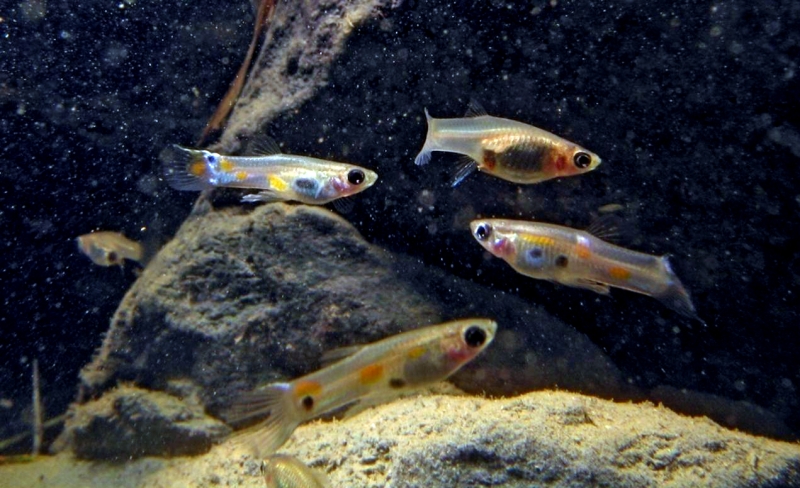
Most of us can accept the theory that given enough time and influence, the environment a species lives in will shape its changes, or evolution, but a University of Nebraska-Lincoln researcher is helping prove that the opposite is true, as well.
UNL School of Natural Resources stream ecologist Steven Thomas is part of a multi-university, multi-disciplinary five-year, $5 million National Science Foundation grant investigating the interaction between ecological and evolutionary changes, using the common guppy (Poecilia reticulata) as its focal organism.
"We've compiled significant data showing us that not only does ecology shape the evolution of a species, as we've all been taught to believe, but that the evolution of a species can shape its surroundings, or environment," Thomas said.
Guppies were chosen as the target species for the research because their basic traits are well documented and they evolve rapidly. They're also native to relatively pristine and untouched streams on the island of Trinidad, which makes for the perfect natural laboratory.
The research, begun about four years ago, is the first comprehensive effort to study links between ecology and evolution in real time in a natural ecosystem, Thomas said.
Alan Tessier, program director of NSF's division of environmental biology, which funds the research, said that in documenting that rapid, adaptive evolution within a single species can cause substantial changes in ecosystem structure and function, this study makes a significant contribution to merging ecological and evolutionary theory.
Thomas said, "This project is providing empirical data on how a species and its environment change in tandem." Popular notions that evolution operates too slowly to produce ecological consequences over observable time scales, such as less than 10 years, are not always correct, he said.
What he and fellow researchers are observing in the pristine and closely monitored stream reaches of Trinidad is that evolutionary changes begin occurring to guppies soon after predation risks are altered. Trinidadian streams are conveniently segmented by waterfalls that isolate guppy populations. As observers move upstream, they find that barrier waterfalls cause fish species to drop out until only guppies and a competitor fish are left. In the absence of predatory fish, guppies develop distinct life history strategies and ecological roles. Changes include such traits as offspring size and number, age and size at maturity, as well as certain aspects of growth, aging and feeding.
Thomas said that from an earlier study, he and biologist David Reznick of the University of California, Riverside, who is leading the 11-member interdisciplinary NSF study, knew that guppies can evolve rapidly. In this study, they are quantifying the ecological impacts of those rapid changes.
In Trinidad, Thomas, Reznick and their colleagues culled guppies from two communities and quantified their impact on a stream ecosystem by placing them in a controlled stream environment, near the natural channel, that they create by diverting spring water through artificial mesocosms, systems larger than a microcosm but smaller than a macrocosm, which then return the water to the natural stream.
They then added insect larvae into the artificial streams. What they found, Thomas said, was that the guppies from the more diverse fish community (those with predators) eat more insect larvae versus guppies from low predation settings that eat more algae. Guppies from high predation sites also excrete more nitrogen than do other guppies. Combined, these differences cause a cascade of effects that influence plant growth, daily oxygen patterns and the rate at which plant matter decays.
These smaller scale experiments complement whole-stream scale experiments currently under way.
In these experiments guppy introductions are combined with light manipulations to examine how specific ecological conditions influence the evolutionary path followed by these fish and what the ecological consequences of those changes are.
Using a marking system that identifies individual fish and an extensive mark and recapture procedure, Thomas' colleagues can quantify changes in fish traits, life history characteristics and population changes.
Simultaneous measurements of ecological variables like invertebrate and algal community structure and abundance made by Thomas and others helps link changes in fish characteristics to their surrounding ecological conditions.
Though analyses are ongoing, "all of these changes show how guppies change a stream when they are introduced to it and become established," Thomas said of early findings.
With their experiments showing that guppies adapting to local environments create changes in the ecosystem that supports them, Thomas said the research now will begin to focus on how the changed ecosystem shapes how the guppies adapt to it.
The study involves 11 researchers, five post-doctoral students and a couple dozen other students and support technicians with expertise in molecular biology, population ecology, ecosystem science, biogeochemistry and applied mathematics. Thomas directs about $468,000 of the $5 million study, working alongside Reznick, as well as Alex Flecker, Cornell University; and Catherine Pringle, University of Georgia, on the ecological feedbacks between food web structure and evolutionary changes.
Thomas' portion of the grant employs a full-time research technologist, several UNL graduate and undergraduate students and helps support post-doctoral researchers at Cornell and Georgia.
Other colleges and universities involved in the study include Drexel University, Siena College, Colorado State University, North Carolina State University, University of Arizona and Florida State University.
- By Steve Ress, UNL Water Center
More details at: http://go.unl.edu/8ky